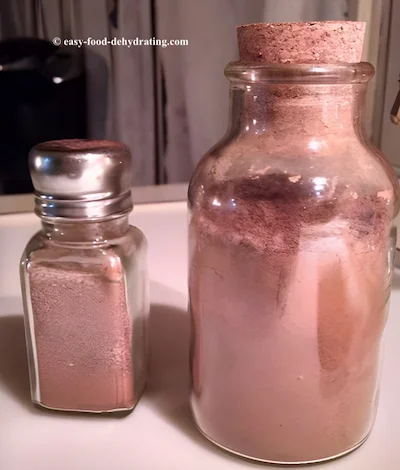- Home
- How to Dehydrate Vegetables
- How to Dehydrate Garlic
How to Dehydrate Garlic:
Elephant or Regular Cloves
Susan Gast, Author
Blogger at Easy Food Dehydrating | A New Sober You | Beesville Books
Garlic lovers, rejoice! Learning how to dehydrate garlic at home is simple, saves money, and ensures you always have bold flavor ready for soups, stews, and sauces. Whether you’re working with classic cloves or jumbo elephant garlic, drying garlic preserves its punch while freeing up freezer and fridge space.
✅ Quick Answer: How do you dehydrate garlic?
Peel and slice garlic cloves ⅛-inch thick, spread on dehydrator trays without overlap, and dry at 125–135°F for 6–12 hours. Rotate trays halfway through. Garlic is ready when slices are brittle. Store in airtight jars, grind into powder, or keep as chips.
Dehydrated garlic isn’t just handy for storage — it can be ground into homemade garlic powder, turned into garlic salt, or enjoyed as crunchy garlic chips that elevate everyday meals.
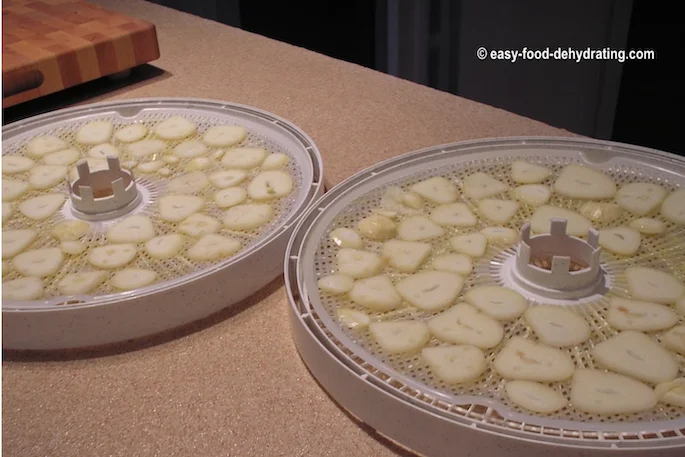 Thinly sliced Elephant Garlic on Nesco dehydrator tray
Thinly sliced Elephant Garlic on Nesco dehydrator trayLet’s walk through how to slice, dry, and even grind your garlic for maximum shelf life and kitchen flexibility.It's easy when you use Elephant garlic, often called Mammoth Garlic! As the name implies, it's much bigger than regular bulbs, like four times bigger!
Oddly enough, elephant garlic is milder in taste than its smaller counterpart. Kinda like peppers, right? The smaller they are, the hotter they are.
Garlic Varieties: Which Type Works Best for Drying?
There are several different types of garlic that you can grow. Some of the most popular varieties include:
Softneck Garlic
Softneck garlic is a type of garlic that is easy to grow and store, has a mild flavor, and is often used in cooking.
Hardneck Garlic
Hardneck garlic is a type of garlic that has a strong flavor and is typically used in pickling or roasting.
Elephant Garlic
Elephant garlic is a type of garlic that is actually a member of the leek family. It has a milder flavor than traditional garlic.
And if you're wondering what on earth "softneck" and "hardneck" means, here's some info.: Softneck garlic has a flexible stem (makes sense) that can be braided for storage!
This type also produces more cloves per bulb than hardneck garlic. And hardneck garlic has a more rigid stem and has a stronger flavor than softneck garlic. So now you know.

Garlic Nutrition Info.
VITAMINS: Vitamin A, Vitamin C, and Vitamin B6, followed by Choline. There are trace amounts of Vitamin K, Folate, Niacin, Thiamine, Riboflavin, and Pantothenic Acid.
MINERALS: Potassium, Phosphorus, and Calcium, followed by Iron and Manganese. There are trace amounts of Zinc, Copper, and Selenium, and contains Omega-3 and Omega-6 fatty acids.
Garlic is great for tons of savory recipes: Soups and stews, and Italian dishes of all types!
Step-by-Step: How to Slice, Dry & Store Garlic Like a Pro
- Peel the bulb and separate the cloves and cut them into 1/8" slices—a mandoline slicer does a fine job of this for the elephant/mammoth bulbs—just watch your fingers, please! With regular (small) cloves, carefully use a paring-type knife!
- Arrange the slices on your food dehydrator trays, making sure the slices don't touch or overlap.
- Turn on your food dehydrator and set the temperature between 125°F and 135°F (or per your food dehydrator's instructions).
💡 Tip: Outside the U.S.? Most dehydrating temps here are listed in Fahrenheit — use our quick converter to see the Celsius equivalent for your machine.
- It will be brittle when fully dried and stores well in a small Mason jar, I just crumble it up when adding it to my soups, etc.
- Drying time: between 6-12 hours.
- Please remember to rotate your trays for even drying.
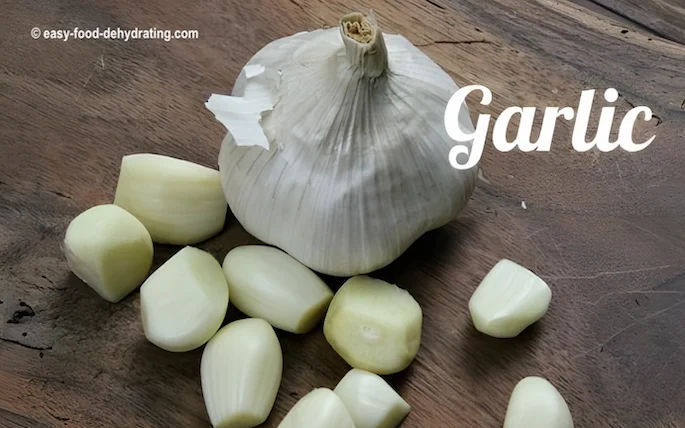
Handle Garlic Safely: Avoid Burns, Stains & Tears
If you're sensitive to handling raw garlic, please read 10 Tips for Handling Spicy Garlic prior to dehydrating it!
Air Ventilation Warning
How to Keep Your Kitchen (and Pets)
Safe from Onion Odor
You may also wish to have
your windows OPEN or put the A/C on
while you're dehydrating onions or garlic... as
the powerful odor
can certainly circulate throughout the entire house!
If
you ABSOLUTELY LOVE onions and garlic,
it's not such a bad thing, but if you don't...
just sayin'!
Air Ventilation
Warning
How to Keep Your Kitchen
(and Pets) Safe from Onion Odor
You may also wish to have
your
windows OPEN or put the A/C on
while you're dehydrating onions or
garlic... as
the powerful odor
can certainly circulate throughout
the entire house!
If
you ABSOLUTELY LOVE onions
& garlic, it's not such a bad thing,
but if you don't... just sayin'!
Garlic Dehydrating Odor Alert:
Keep Your Kitchen (and Pets) Safe
When dehydrating garlic, watch out for strong odors as mentioned earlier.
Either you LOVE garlic, or you DON'T!
Garlic Dehydrating
Odor Alert:
Keep Your Kitchen
(and Pets) Safe
When dehydrating garlic, watch out for strong odors as mentioned earlier. Either you LOVE garlic, or you DON'T!

DIY Garlic Salt: Turn Dried Garlic into a Flavor Bomb
Did you know, you can grind up dehydrated garlic to make garlic powder? Just add equal amounts of salt to the ground powder and you now have homemade Garlic Salt.
NOTE: While dehydrating your garlic, consider dehydrating onions at the same time if you've got a spare dehydrator tray or two available! In other words, don't mix garlic and onions with, say, apples, when dehydrating—unless you WANT your APPLES to taste like GARLIC or ONIONS!!
TIP: If you're out on a date, make sure you both eat this pungent veggie. You'll thank me later for that tip!
Dehydrating garlic is an odorous job... so please run your range hood vent (if you have one) and place your dehydrator as close to the vent hood as possible. Doing so will help enormously to take the garlic odor out of the kitchen and away from your pets' sensitive noses and nervous systems— garlic aroma is poisonous to them!
Julie’s Smoked Garlic Salt: A Delicious Homemade Twist
Check out Julie's great post on how she dehydrates her garlic with added sea salt!
Not only does it look amazing, but she assures us it tastes amazing too!
Quick Garlic Bread Recipe Using Your Dried Garlic
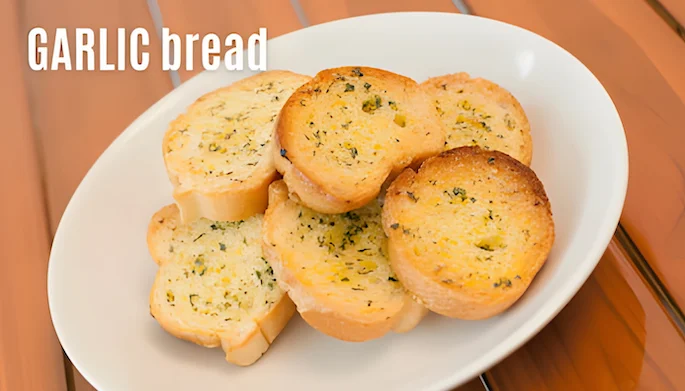
Garlic bread is often served as a side dish or an appetizer.
Here's a quick and easy recipe for garlic bread:
Ingredients:
- 1 loaf French bread
- 1/2 cup butter, softened
- 1/4 cup minced garlic
- 1/4 teaspoon dried parsley
- 1/4 teaspoon dried basil
- 1/4 teaspoon garlic salt
Directions:
- Preheat oven to 350°F.
- In a small bowl, mix together butter, garlic, parsley, basil, and garlic salt.
- Cut the bread loaf in half horizontally. Spread the butter mixture over the cut sides of the bread.
- Wrap the bread in aluminum foil and place it on a baking sheet.
- Bake for 10 minutes, then remove from oven and unwrap. Return to oven and bake for an additional 5 to 10 minutes, or until bread is lightly toasted.
💡 Tip: Outside the U.S.? Most dehydrating temps here are listed in Fahrenheit — use our quick converter to see the Celsius equivalent for your machine.
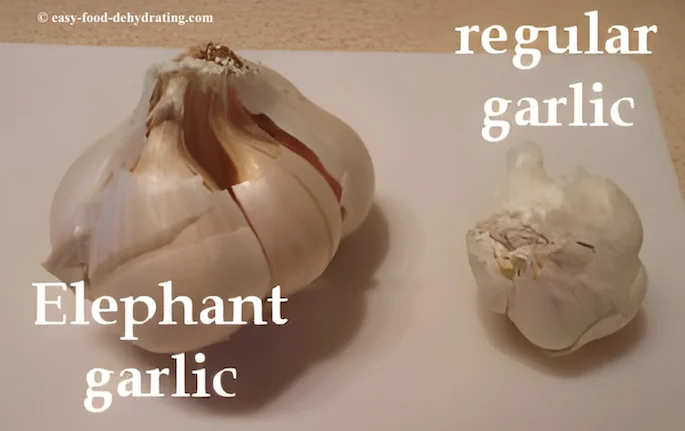
“That’s Not Garlic… THIS is Garlic!” 🐊
A Nod to Crocodile Dundee:
If you've ever seen the movie Crocodile Dundee
you'll
appreciate this comment about 'regular' versus 'Elephant':
"You
call that garlic?
Now this...
(pointing to the elephant bulb)
... is
Garlic!" :-)
Garlic Dehydration FAQs: Chips, Powder & Storage
Can you dehydrate garlic chutney into powder?
Can you dehydrate garlic chutney into powder?
Yes! Spread thin layers of garlic chutney on lined dehydrator trays and dry at 145°F for 6–8 hours. Once brittle, grind into powder with added salt for a savory spice blend that lasts up to a year.
How do you make crispy dehydrated garlic chips?
How do you make crispy dehydrated garlic chips?
Slice garlic cloves 1/8" thin, toss with oil and optional salt, then dehydrate at 125°F for 6–10 hours. Rotate trays halfway through for even drying. Once crisp and brittle, store in an airtight container. Delicious on soups, salads, and pastas!
How long does dehydrated garlic last?
How long does dehydrated garlic last?
When stored in an airtight container in a cool, dark place, dehydrated garlic can last up to 12 months. For longest shelf life, avoid humidity and keep it away from direct light and heat.
What’s the best way to grind dehydrated garlic into powder?
What’s the best way to grind dehydrated garlic into powder?
Use an old coffee grinder, spice grinder, or high-speed blender. Keep this old appliance just for garlic, and/or onions! Be sure the garlic is completely brittle before grinding — if it bends or feels leathery, it needs more drying time.
Is dehydrated garlic as healthy as fresh garlic?
Is dehydrated garlic as healthy as fresh garlic?
Yes, mostly! While it may lose a small amount of vitamin C during dehydration, garlic’s beneficial compounds like allicin, along with its antioxidant and antimicrobial properties, remain well preserved in dried form.
Do you need to blanch garlic before dehydrating?
Do you need to blanch garlic before dehydrating?
No, garlic does not require blanching. Simply peel, slice, and dry directly. Skipping blanching keeps the flavor sharp and speeds up prep time.
What’s the best way to store dehydrated garlic long term?
What’s the best way to store dehydrated garlic long term?
Store dried garlic in airtight jars in a cool, dark place. For longer storage, vacuum seal or keep in Mylar bags with oxygen absorbers to extend shelf life beyond a year.
Can you dehydrate garlic in an oven instead of a dehydrator?
Can you dehydrate garlic in an oven instead of a dehydrator?
Yes. Set your oven to its lowest temperature (around 170°F), place garlic slices on parchment, and crack the oven door for airflow. Drying may take 6–10 hours.
Dehydrated garlic might leave your kitchen smelling bold, but the flavor payoff is worth it! From garlic chips sprinkled on pasta to homemade garlic salt for soups and jerky, the options are endless.
For even more inspiration, grab your free 5 Dried Food Recipes You’ll Actually Love PDF below — featuring carrot soup, minestrone, split pea soup, spicy beef jerky, and banana cinnamon rolls.
Get 5 Dried Food Recipes You'll Actually Love
Here's where you can get your copy of our all new
5 Dried Food Recipes (That Actually Taste Great)
They're my all-time favorite easy dried food meals!
Get it here right now.
For Free!
Before You Go...
If you like the content, please give me some love by clicking on the 🩷 in the lower right-hand corner (on just about all my pages). This signals to me that you find it enjoyable and useful.
And don’t forget to grab your FREE 5 Dried Food Recipes via the opt-in form — they're waiting for you! Thank you so much! (Get it here).

